5 Essential Marketing Tactics of Self-Publishing Authors
15:00 EST - Jul 20, 2022

Clayton Noblit
Clayton Noblit is a senior marketing manager at Written Word Media. He is passionate about helping authors find their readers and finding ways to sell more books. When he’s not working, he enjoys spending time with his family, playing sports, and making beverages.
Well, thank you for joining me today.
It's an honor to be here in front of you. Today I will talk about an author's five essential marketing tactics. My name is Clayton Noblit. I'm the senior marketing manager at Written Word Media. I've been at written word media for almost four years now. And my job there is to acquire readers for our email lists and to share what we do with authors.
Today we're gonna cover the five essential tactics for marketing a book:
- The importance of being findable.
- How you should use your back matter,
- Why every author needs an email list,
- Price, promotions, and
- Digital ads.
I am not an author, but I am a digital marketer. And so hopefully, during this presentation, I'll be able to offer a different lens on book marketing. We'll hopefully shift how you look at a few things, get those gears turning and help you think of different ways to market your book.
We survey authors every year at written word media. And something we hear from authors every year, regardless of how many books they've published or how much they're earning from their writing, is that marketing is the hardest part of being an author. So if you are frustrated with book marketing, you are not alone.
Almost every author seems to struggle with this. As a professional marketer, I also find it very difficult. It's a challenging thing. It involves a lot of failure — but hopefully, these tips can make this process easier or more exciting for you.
Tactic #1. Be Findable
The best test for being findable is if one of your readers was talking to one of their friends and they mentioned you and your book — would their friend be able to Google your name or the name you write under and find your books?
That's what being findable means in this digital age. So a great way to be findable is to have an Amazon author page (if you publish on Amazon) or an author page on other platforms (if you're wide). And so, with your Amazon author page, you must have a full description with a call to action (CTA).
And so we've got an example here from, from Pippa Grant. And she's done a great job here.
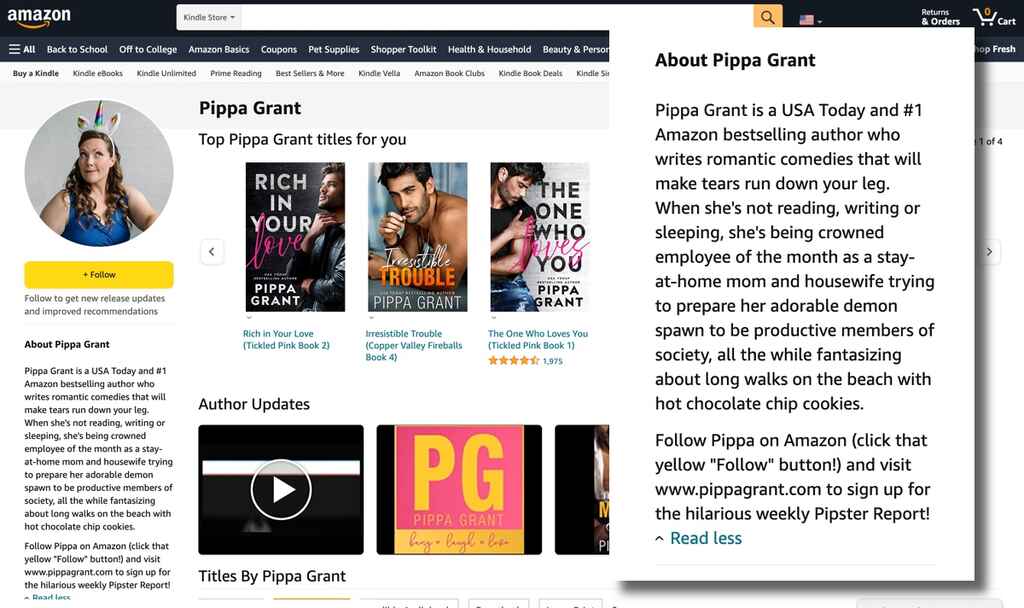
She gives you a little bit of information about herself. She includes some awards she's won. If you haven't won any awards yet, that's fine. You can just skip that section. And she describes what she writes about and gives you a little bit of her personality and things she enjoys. And then at the end of this, this short kind of peppy description.
You'll notice that Pippa has two calls to action or CTAs. First: she's asking us to hit that yellow follow button, which you can see on the screen. It's a very easy thing for a reader to do. And second is to go to her website and sign up for her mailing list.
What makes this second CTA so great is she's not just saying, "Hey, go check out my website." She's saying, "Go check out my website AND sign up for this newsletter." So that makes it very easy for a reader to go to the website, click on the newsletter, and sign up. It sounds simple, but when you give somebody a task and a reason to go to your site, they're much more likely to go to your site and then take that action (instead of just saying, "please visit my website").
You want to make it as easy as possible for them to learn more about you and connect with you so you can share more of your work with them. If you have another book coming out years down the road, they're on your email list, and you can let them know about it then.
Use a real photo
Another thing Pippa does well on her Amazon page is she has an actual photo of herself on the author page. This can be a little awkward and a little unnerving. I know my headshot was out there for this webinar, and I don't like seeing my photo online. I don't like thinking about other people looking at me. Being on camera now is not necessarily the most comfortable thing for me. And I think a lot of authors are, are the same way.
Putting a real photo of yourself up can make you feel a little nervous, but I would counter with the benefit of having a real picture — and it is significant:
When someone sees a photo of you on your author page, they're gonna connect with you much more profoundly than they would if they saw a book cover, an illustration, or something like that.
When someone goes to Pippa's author page, they see that Pippa's a real person. And then, when they go to her website, they can also see that she has a headshot. They know that she's the same person. That makes it much more likely for the reader to invest in her as an author.
So whenever possible, use a real photo on your author page. With how good camera phones are these days, you can get someone in your family to take a photo of you against a nice background. Just make sure the focus is good and have a smile on your face.
Facebook author page
So the second part of being findable is your Facebook author page. And so here we have an example from Addison Moore. Addison has been booking promos with us at Written Word Media for a long time. Something that she does really well is she's added "books" or "author" to her Facebook page title.
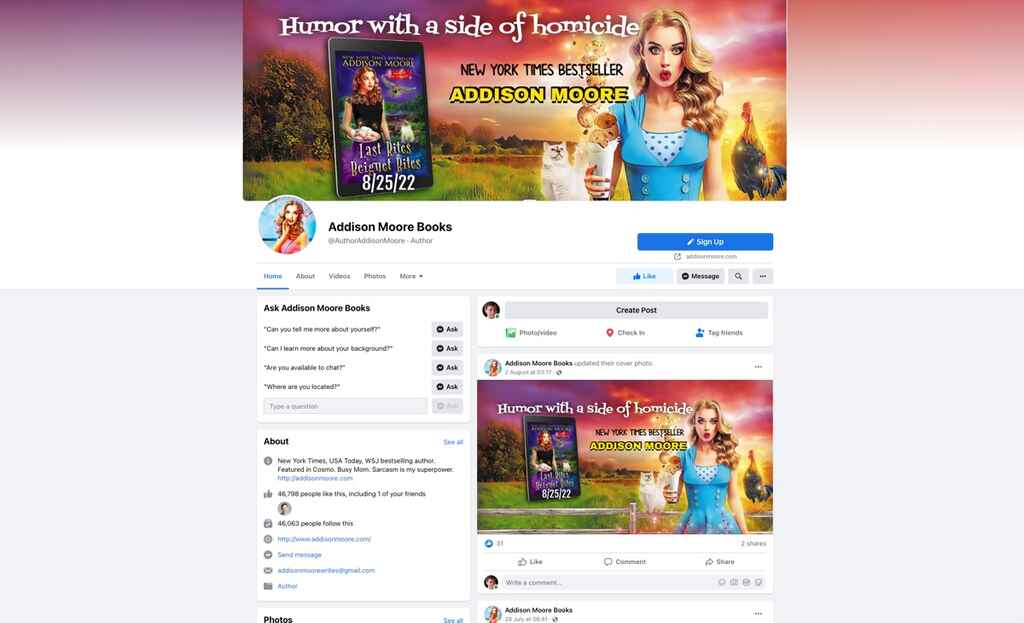
This simple, easy thing makes a difference: when someone searches for your name on Facebook, they'll likely get a whole list of results. I'm much more likely to click on "Addison Moore Books" or "Addison Moore Author" than I am to click on "Addison Moore." If you don't have "author" or "books" or something to indicate that you're an author. If someone searches for you, they could go to the wrong profile.
If they can't find you right away, they might give up. So this is all about removing steps and making things as easy as possible for readers to follow you and buy your books.
Another great thing Addison does here is in the ABOUT section on the left side of her page. She has a concise description and then a link to her website. This makes it very easy for readers to take that next step to connect. You can see she's recently posted about a sale on one of her books.
If I'm a reader and I end up on this Facebook page, it's very easy for me to like the page and get notifications about her posts. It's straightforward for me to take advantage of the sale she's running and just click that button and go to Amazon to buy the book. It's also very easy for me to go to her website and sign up for her email newsletter, which will tell me more about Addison and her books.
Social media
I think a Facebook page is a very easy thing to create. Most people are on Facebook and are comfortable using it, and it doesn't require much interaction to have a page.
If you're going to be running Facebook ads, eventually, you will need a page to run the ads from. So, I recommend that just about every author create a Facebook author page but also dip into other social media.
Focus on what you're comfortable with and enjoy. For example, Twitter. Some people sell books using Twitter, but it's rare. I don't hear many authors saying, "Yes, I'm driving all of my book sales from Twitter."
Twitter's a great place to talk with other writers and readers, if that's what you're interested in. But it's not gonna make or break your book sales for most authors.
Instagram and TikTok are also great places. Most of you have heard of bookstagram and booktok — online communities interested in books, reading, and writing.
But the thing about these is they take an interest in creating content and putting in the effort to be part of the community. For some authors, this is gonna be easy. You're gonna be excited about this, which is fantastic: You should create a TikTok account and an Instagram profile. For other authors, being on Instagram and TikTok will be draining — or you might not enjoy it as much. And that is fine. You don't have to be on these platforms. Let's not make it harder by doing something you don't like.
If you have multiple social media accounts, allow readers to follow you on the platform they like the most. So, for example, if I go to Facebook and see Addison Moore's page, I prefer to use Instagram. Then I might go to my Instagram app and search for Addison more there.
If I see the same profile photo in those tiny search results in the little thumbnail, I'll be much more likely to find the correct profile to follow. So having that same profile photo across your social media helps build your author brand. And it makes it easier for readers to find you. So if possible, I recommend you to have the same profile photo across your social media profiles.
Author website
So this is a great way to be findable and appear in search results on Google.
And so there are tons of ways to make websites these days. But it does take a little more work than setting up a Facebook page or even an Amazon. Page. But there are tons of tools: Wix, WordPress, and Squarespace are just a few.
There are also tons of great articles on how to build a website for authors and step-by-step guides.
You don't need to put a lot up here. Here's an example of Brent Jones's homepage.
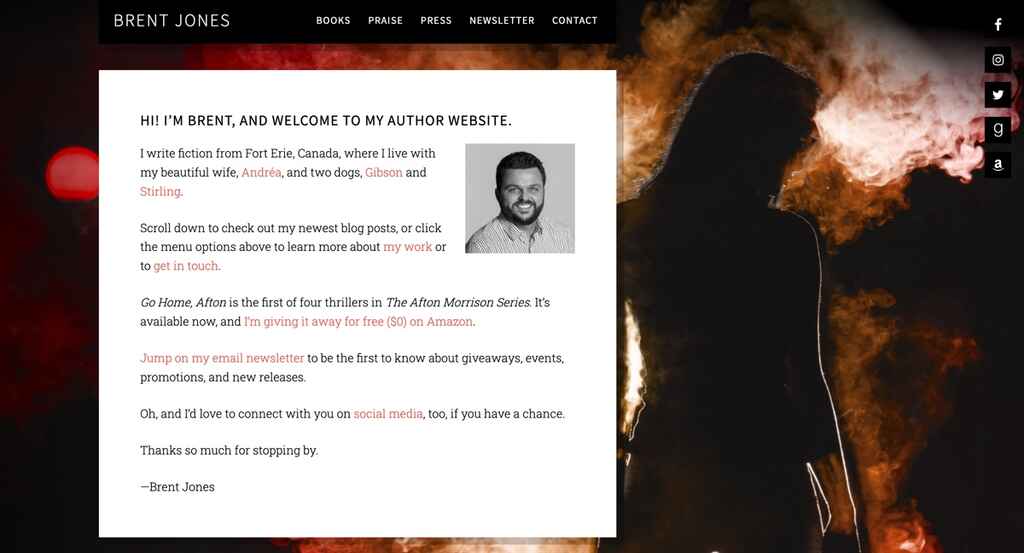
He talks a little about himself: his family and dogs. That's just building that connection with the readers.
As we go down, he has some asks for readers. He says:
- You can go over here and buy my series.
- You can join my email newsletter.
- Or you can follow me on social media.
So he's laying out all the ways all readers can connect with him. You can also have reviews of your books on your website.
Host your newsletter list
Then… the fantastic thing about having a website is it will allow you to have an email newsletter.
There are tons of ways to set up email newsletters. Many places will build websites and mailing lists simultaneously: I think you can build a website and an email newsletter with MailChimp these days. But I think email is the number one reason an author can build a website (which we'll touch on in a minute).
Using your back matter and front matter
So the back and front matter of your book are the sections before the story starts. These are great opportunities for authors to share and build connections with readers.
So if someone is reading the back manner of your book, they have just finished it. Not only have they purchased your book, but they've also read the entire thing. And so this is a reader that likely enjoys your work. And probably will want more of it.
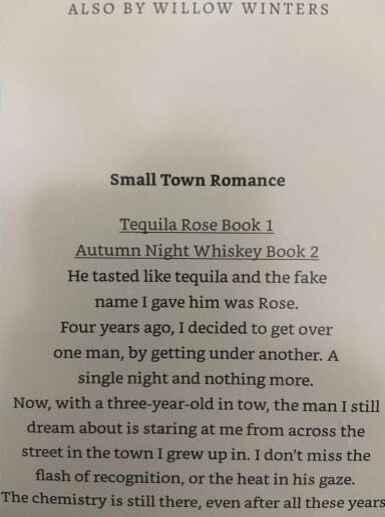 And so it's really important to make it easy for them to find more of your stuff. In your back matter, you can include a section like Willow Winters has done at the end of her ebook. She has a ton of books published. So she just has a link to buy her book on Amazon. And so this is so easy for a reader to buy the next book.
And so it's really important to make it easy for them to find more of your stuff. In your back matter, you can include a section like Willow Winters has done at the end of her ebook. She has a ton of books published. So she just has a link to buy her book on Amazon. And so this is so easy for a reader to buy the next book.
If you have a series or multiple books published, it is easy for the reader to continue and enjoy more of what you have to offer as an author.
You can also link to your newsletter. If someone has just finished your book and has got to your back matter, they are likely a fan of what you've had to write. So allow them to follow you and support you by putting a link to your website and asking them to sign up for your newsletter.
I'm going to hit this again: I think having a real photo in your book's front matter and back matter with your author bio is powerful. It builds that brand — it creates that connection that says, "Hey, I'm a real person. I love this story. I'm so happy you read it".
Tactic 3. Email
We discussed this a little earlier with the importance of the email newsletter sign-up. Let's talk briefly about what's happening in digital marketing right now. You may have heard in the news over the past couple of years that the tech giants like Facebook and Apple are moving towards valuing privacy a little bit more. Now, we can debate if they're actually doing that, but it's a little more difficult to run ads to specific people across different platforms. Facebook ads are more difficult to run, as are ads on Google.
So we're seeing that email is the most valuable tool to market whatever product you have. This is true for almost every industry in the world right now. And it's certainly true for the authors — you have a direct line of communication with them. People check their email almost every day. And that you can't really get that in any other area of digital marketing.
Another great thing about email is that it is cheap. Compared to running ads on platforms, email is often much cheaper.
And it's also communication with people that have opted in to hearing from you. When I'm watching TV, and I see an ad for Coca-Cola, I don't sit down in front of the TV and say, "All right, I would love to see an ad about Coca-Cola." But it does come in front of me. Email is different because when you sign up for an email list, you say, yes, I want to hear from you. I want to know what you have to say.
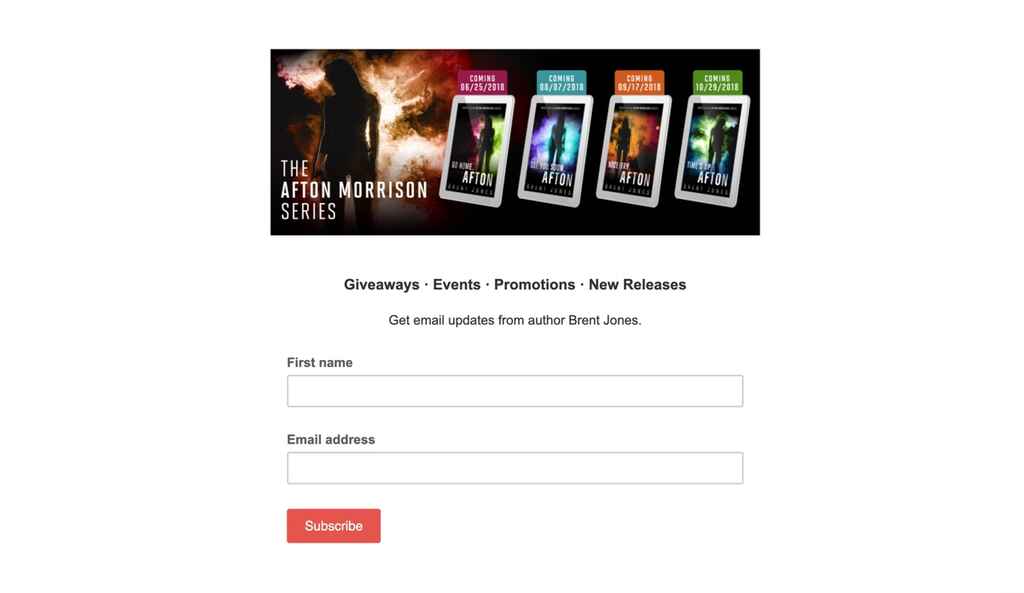 And so these are extremely valuable people. They've signed up for your email list and likely want to hear more about your books. They want to buy more of your books. They want to know about you. And they want to know when you have a new book coming out.
And so these are extremely valuable people. They've signed up for your email list and likely want to hear more about your books. They want to buy more of your books. They want to know about you. And they want to know when you have a new book coming out.
A lot of email services have free options. With MailChimp, I think you can have up to maybe a hundred subscribers for free. So there are many free options if you have a small list and you're just starting.
There's the saying that, you know, the best time to plant a tree was 10 years ago. The second best time is right now. I think that's certainly true for email. If you don't have an author website, I will encourage you to get one up and set up an email list. This will pay dividends as your email list grows over the years. So yeah: email, email, email.
Tactic 4. Price promos
So, price promos are all about lowering the price of your book for a specific time. Or you could have a low price for the first book in your series for an extended period. So you lower the barrier to entry for readers.
When a reader who hasn't heard your name before (or hasn't read any of your books before) looks at your book on a site like Amazon, they need to decide if they should spend their money to read your book, and they might be unsure. But if your book price is low, they're more likely to take that risk and give it a shot.
It's also an excellent way for authors to get those reviews. I always hear from authors that have just published a book and are having a hard time getting reviews on Amazon. Having a five-star review early in your book can help readers decide to buy your book. By dropping your price, you can get more people to test out your book, read it, and review it.
Price promos are especially effective for authors with multiple books or writing in series — say you have a three-book series. You can have a cheap first book in the series. Some people will read that first book for $2 and be much more likely to pay full price for those next two books. So it's a great way to kind of get people into your world and get them to test out your.
What promotions to promote
If you are enrolled in Kindle Unlimited — Amazon's exclusive publishing program — you get access to the Kindle countdown deal. This Kindle countdown deal is really powerful. It could really help drive readers to make that purchase now. Cause I know they won't be able to get these same savings later.
If you're published wide or want to use a free day on Amazon, you can just drop the price of your book (or make it free) for a limited period. This is a great way to goose your downloads and get more people to read, review, and hopefully read more of your books.
Promo your promos
A great way to capitalize on price promos is by running promotions with promo sites like Written Word Media (the company I work for).
Basically, authors drop the price of their books for a limited period of time. Then they pay a company like mine to email thousands of readers and say, "Hey, this book is priced at $2.99 for a limited period. Go here and get this deal right now."
This way, when your price is low, you get a ton of new downloads, and your book shoots up the charts on sites like Amazon — then more people see it when they are just browsing through.
Price promotion can be paired with different advertising techniques to benefit authors even more. You can also run digital ads while you're running a price promo. And this once again is helping getting more readers to the book while it's discounted and get people to take advantage of this deal.
And so, yeah, this is a great way to get readers to take a chance on you if they haven't heard of you before — then they'll hopefully sign up for your newsletter. If you have another book coming out eventually, or if you already have multiple books, they're much more likely to go on and pay full price for other books down the road.
Tactic 5. Digital Ads
Digital ads are a great way for authors to sell books online. They can be complicated to learn how to use, but a lot of full-time authors I talk to are running digital ads, and a lot of them are running ads on Facebook.
Facebook ads
Results do vary. It takes time to learn how to use Facebook ads. But thankfully, there are a ton of great information: paid courses and free information. I really recommend diving into Facebook ads. Learning how to run these can be a really big turning point for authors.
Start small
When you start out, I recommend starting it with a low spend with multiple campaigns.
On Facebook, you can target different interests. So for example, if you have a mystery book, you might target people who like very popular mystery authors. You can serve them an ad of your book with a cover that makes it very clear that yours a mystery book — those people may be more likely to click on the book and buy it.
And so we recommend starting with a low spend: targeting different interests and testing what works the best.
We also recommend testing a variety of creative: try different images and copy. This is all considered "the creative," so you can test different wording and images and see what gets the most readers to click on the book for the cheapest amount of money.
Amazon ads
Another platform that I think authors should test out is Amazon. People are already on Amazon. They're in a buying mood. So if you get your book in front of them while browsing through other eBooks and products on Amazon, they might be more likely to just click on it and buy it right away. After all, They may already be looking for a book.
Amazon ads, like Facebook ads, can be a little complicated. But once again, there's a ton of great information about how to run Amazon ads for authors specifically.
As with Facebook, start out with low-spend campaigns. We found that sponsored product ads — a particular type of ad on Amazon — work on long campaigns for books. Then also, test different targeting: different interests and audiences, and see what works best for your book. Every book is different, so different audiences are, will react differently. When it comes to digital ads, it's all about testing.
Research and learn as much as you can. There's a lot of great information out there that will save you a lot of headaches. Plus, I find it really inspiring to hear about other authors' success and learn how they did it.





